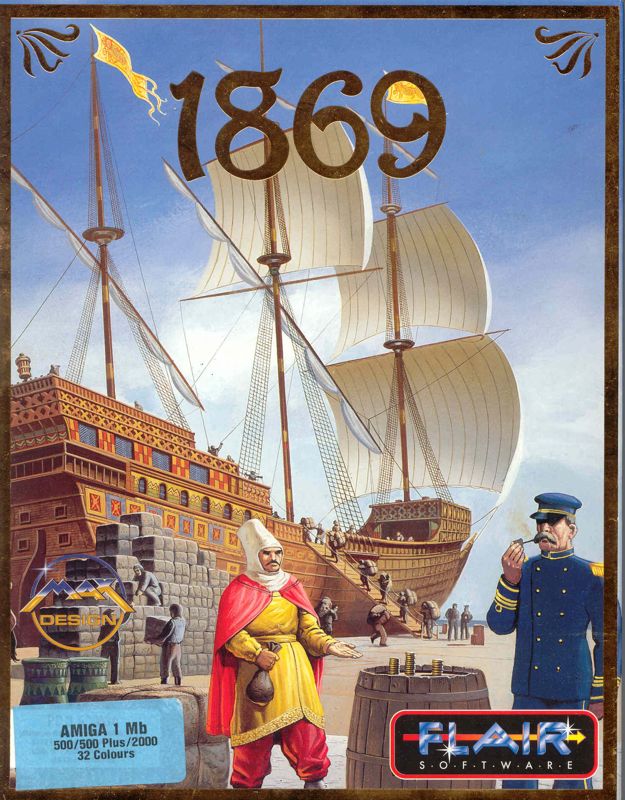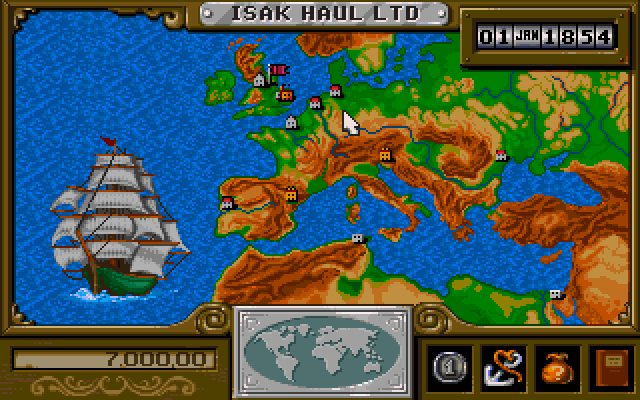Retro Replay Review
Gameplay
1869 delivers a methodical and satisfying trading simulation that places economic strategy front and center. As a newcomer in the 19th-century merchant world, you begin by purchasing a modest vessel and recruiting a crew. From there, your primary task is to load cargo, plot a voyage, and sail toward ports where demand for your goods promises profit. The core loop of buying low and selling high is intuitive, yet deep enough to keep budding captains engaged for hours.
(HEY YOU!! We hope you enjoy! We try not to run ads. So basically, this is a very expensive hobby running this site. Please consider joining us for updates, forums, and more. Network w/ us to make some cash or friends while retro gaming, and you can win some free retro games for posting. Okay, carry on 👍)
Unlike action‐oriented titles, 1869’s gameplay revolves around careful planning and resource management. You spend your days charting sea routes on an interactive map, factoring in distance, travel time, and the fluctuating market rates at each harbor. Random events—ranging from favorable weather to unexpected pirate threats—add tension, forcing you to adapt your schedule or risk costly delays. These unpredictable occurrences ensure that no two journeys feel exactly alike, even if the overall structure remains consistent.
As you accumulate profits, you’ll face bigger decisions: should you reinvest in faster ships, diversify your cargo, or take on high‐profile assignments that pay handsomely but demand punctual delivery? The game steadily scales in complexity as you establish regular trade routes and expand your fleet. Balancing maintenance costs, crew wages, and port fees becomes a rewarding challenge for players who revel in micromanagement and long‐term strategic planning.
Graphics
Graphically, 1869 opts for a clean, functional aesthetic that suits its strategic focus. The top‐down world map is detailed enough to display major shipping lanes, port icons, and weather indicators without overwhelming the player. While there are no flashy 3D ship models or real‐time water rendering, the simple visuals keep the UI responsive and easy to navigate—crucial when you’re juggling multiple vessels and trade routes.
Ship sprites and harbor icons carry a subtle charm, evoking the period setting with flags, masts, and period‐appropriate dockside imagery. Animations are minimal, primarily confined to waves lapping at a hull or a flag fluttering in the wind, but they’re effective in bringing the map screen to life without detracting from the strategic overview. Menus are logically arranged, with clear tooltips that explain market prices, crew morale, and other key metrics.
Overall, the graphics of 1869 may feel dated compared to modern 3D simulators, but they excel in clarity and usability. Every piece of information you need is visible at a glance, and the understated art style ensures that you remain focused on the economic decisions that drive the game. For fans of retro‐inspired management titles, the visuals are more than adequate to support long trading sessions.
Story
1869 doesn’t rely on a scripted narrative or cinematic cutscenes to propel you forward. Instead, the story emerges organically from your own adventures at sea. Each profitable trade route you establish becomes a chapter in your merchant empire’s rise, and every near‐miss with a storm or a band of pirates is a cautionary tale you’ll recount with pride—or regret.
Special contracts act as narrative milestones, offering challenges that tie into the wider economic backdrop of the 19th century. Deliver medicine to a war‐torn colony, transport exotic spices for a royal banquet, or rush luxury goods to an eagerly awaiting aristocrat. Completing these assignments on time not only boosts your coffers but also reinforces the sense that you’re part of a bustling, interconnected world.
While there’s no overarching protagonist or scripted dialogue trees, the emergent storytelling is surprisingly engaging. You craft your own legend, from humble beginnings to head of a major trading company. The sense of progression—measured in larger fleets, extended routes, and fatter profit margins—becomes the driving narrative force that keeps you invested in your vessel’s fate and the markets you serve.
Overall Experience
For players seeking a tranquil yet intellectually stimulating journey, 1869 is a hidden gem in the management‐economy genre. The deliberate pacing and emphasis on planning over reflexes set it apart from action‐oriented titles. Though the gameplay can feel slow at first, the satisfaction of watching your modest merchant venture blossom into a vast trading network is deeply rewarding.
There is a learning curve to mastering route optimization, market speculation, and event mitigation, but tutorials and in-game tooltips guide you smoothly through the early stages. Once you grasp the fundamentals, every decision—from which goods to load to which ports to avoid—carries weight. The occasional high‐stakes contract keeps motivation high, and the risk of bankruptcy adds a thrilling edge to your economic exploits.
1869 isn’t for everyone, but for enthusiasts of strategic trading sims and historical commerce, it offers hours of engrossing gameplay. Its straightforward visuals and absence of combat-focused mechanics mean the spotlight remains firmly on the market and your ability to navigate it successfully. If you’re ready to don the cap of a 19th‐century merchant and build your own shipping empire, 1869 delivers an experience rich in challenge and immersion.
 Retro Replay Retro Replay gaming reviews, news, emulation, geek stuff and more!
Retro Replay Retro Replay gaming reviews, news, emulation, geek stuff and more!









Reviews
There are no reviews yet.